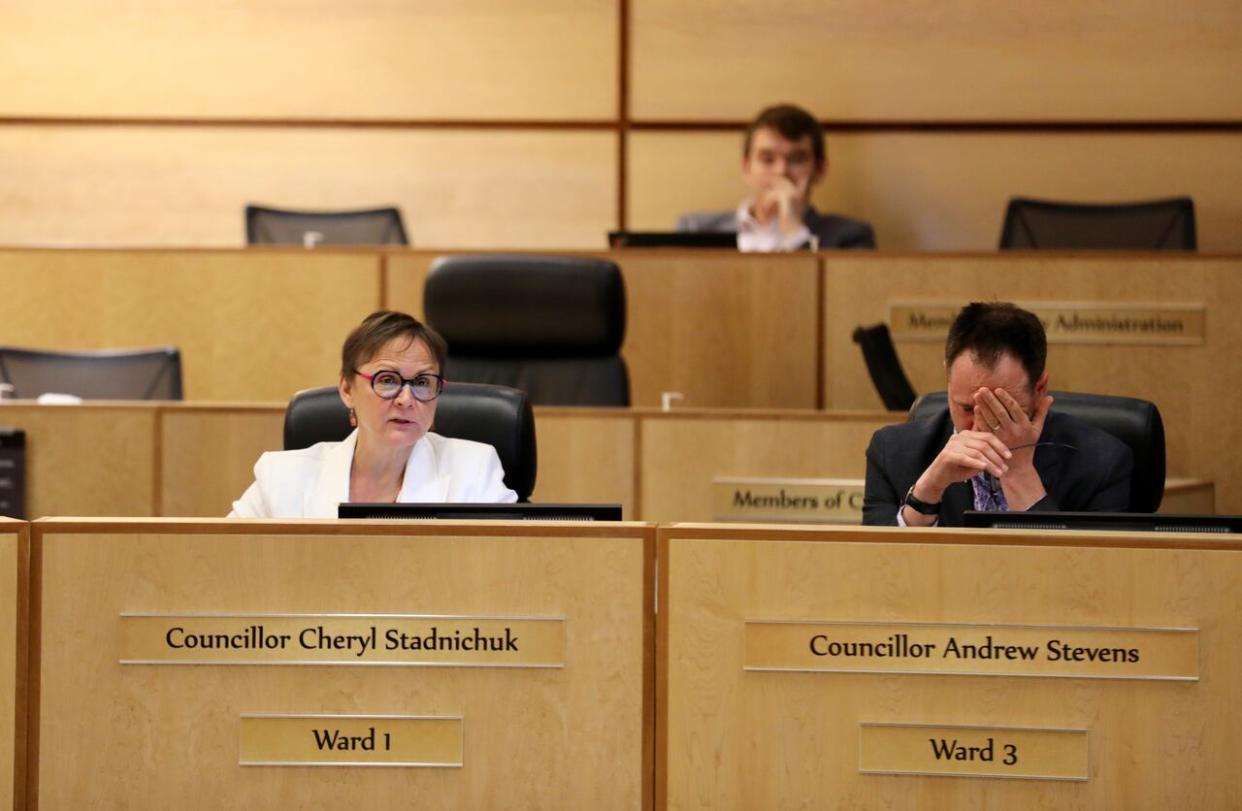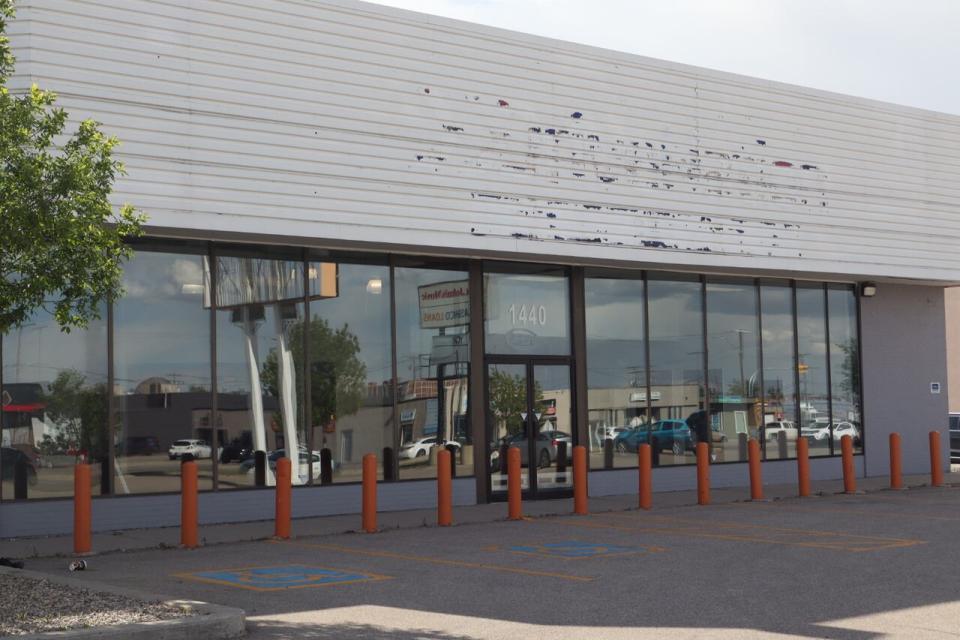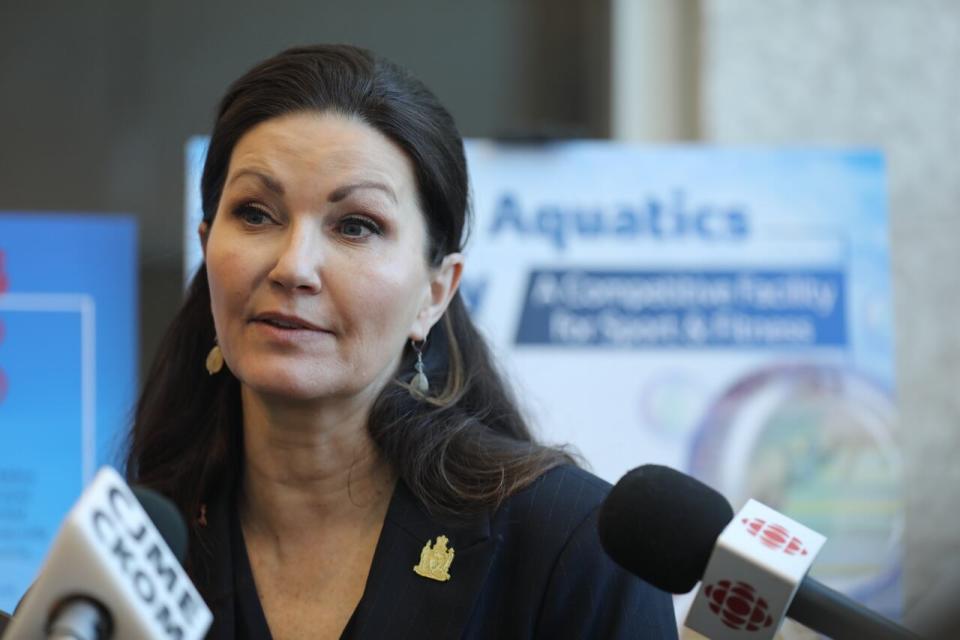'Missing in action': Regina council rejects permanent emergency shelter on Albert Street

A three-year-long search through 35 properties resulted in just a single recommendation from City of Regina staff on where a permanent, emergency shelter should be located.
The property at 1420 Albert St. — being sold as part of a package with 1440 Albert St. — was going to be "as good as it is going to get," according to city manager Niki Anderson.
After more than seven hours of debate on Wednesday, a majority of Regina city councillors told city administration to keep on looking.
The federal and provincial governments were going to cover 80 per cent of the $7.5 million deal in front of council to purchase and renovate the property into a 55-bed shelter.
It would effectively replace the temporary emergency shelter operating at the Nest Health Centre. The city's lease at the facility is set to expire in Summer 2025.
The decision by Ward 2 Coun. Bob Hawkins, Ward 4 Coun. Lori Bresciani, Ward 5 Coun. John Findura, Ward 9 Coun. Jason Mancinelli, Ward 10 Coun. Landon Mohl and Mayor Sandra Masters to pass on the purchasing option drew harsh condemnation from their council counterparts.
"I think we collectively look like a bunch of morons," said Ward 3 Coun. Andrew Stevens, whose ward covers the North Central neighbourhood where the shelter would have been located.
Ward 6 Coun. Dan LeBlanc said a majority of council is "missing in action" when they attempt to address homelessness.
"If we had a book about this Council's approach to homelessness, it would be called 'Thoughts and Prayers,'" LeBlanc said.
WATCH| Regina's mayor explains why voted against a permanent shelter on Albert Street
City staff must now once again begin searching for a location that will be approved by council.
Anderson emphasized that the discussion left her "baffled" on how to find a property that would overcome the variety of complaints put forward by public delegates and echoed by councillors.
"[City staff] don't believe we will come up with a better option," said the city manager.
Anderson confirmed the decision Wednesday means this council, with an election set for Nov. 13, will not be the group of 10 councillors and one mayor who will decide on the permanent shelter location.

This vacant building was one of the properties being considered as the site of a proposed emergency shelter in Regina. (CBC/Radio-Canada)
Masters defended her vote against purchasing the properties on Albert, saying that council may still have work to do in alleviating concerns over safety and potentially creating buffer zones that require shelters to be placed a certain distance away from buildings such as schools.
"I don't think the work is done," she said.
Even if council is unable to find a replacement location, Masters said the city has contingencies to temporarily fill the gap when the shelter at the Nest Health Centre closes.
She would not provide specifics but highlighted the city's hockey rinks or community centres as an option.
Concerns include safety, property values
Residents Florence Stratton and Andrea Soesbergen reminded council that although a permanent shelter was needed, this would not actually increase the number of spaces in shelters.
It would just be shifting the 55 beds from the Nest Health Centre to another location, they said.
"More needs to be done as shelters are routinely full night after night amidst this homelessness crisis that the city is facing," said Soesbergen.

Regina Mayor Sandra Masters, pictured in a file photo, voted against the recommendation of city staff. (Alexander Quon/CBC)
Soesbergen urged the city to come up with a plan to address an issue that has repeatedly appeared in front of this council during its nearly 4 year term.
Ward 6 Coun. Dan Leblanc echoed the sentiment in his comments, describing it as the "animating feature" of this council.
Delegates like Dustin Plett appeared to have swayed a majority of councillors.
He and others raised concerns about the location not being appropriate and that the property values of neighbouring residents would fall as a result of the shelter's presence.
Plett told council he owns two rental properties on Angus Street, just metres from the proposed location that would house 60 residents and more than 30 families.
The landlord told council he had concerns that the proposed shelter would result in an increase in crime, traffic and the presence of dangerous drugs or drug paraphernalia.
Plett recently purchased two empty lots where he plans to build buildings with another 24 units. He said his plans would change if the permanent shelter was placed at 1420 Albert Street.
"If you build this facility here. If you move it there, I will not build and I'll likely sell my real estate and I know that other investors will back away from the area as well," Plett said.
After the decision on Wednesday, Plett said he was happy with the result.
Deal primarily covered by province, federal government
The option for the city to purchase the properties at 1420 and 1440 Albert St. will expire on June 19, meaning council had to reach a decision on Wednesday.
While the federal government's one-time housing and transit funding grant of $3 million is still available and so is the $1.5 million the city was going to commit from its Social Development Reserve, the provincial government's contribution is now in question.
Anderson told council that the city had initially only received a commitment of $1.5 million from the province but were able to get that increased to $3 million contingent on the purchase of the properties on Albert Street.
Even if the city were to find a property and council were to approve of its purchase there's no guarantee that the province will commit to the same level of funding, Anderson said.
There's also no guarantee the city could get another property ready to replace the temporary shelter at the Nest even if it was purchased within the next few months.
Masters successfully moved an amendment that could see the money be invested in another group purchasing or creating a permanent shelter.
"I don't necessarily want to own the real estate," Masters admitted.
Staff who believed the recommendation met the requirements of "easy access to community services, core city areas and public transit" will provide an update on their renewed search at the final meeting of this council on Oct. 9.


